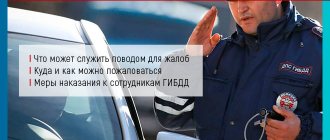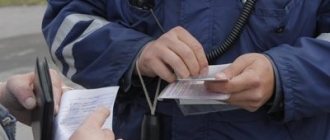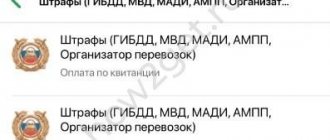Legislation regarding road safety is changing very dynamically. In August 2021, the New Traffic Police Regulations were adopted; 2021 has already brought changes to it.
Below in this article we will dwell in detail on the changes that were made to the activities of the traffic police by Order No. 664 itself, as well as what additions were made directly to this document, since they concern not only employees of the state inspection, but also ordinary citizens.
Information about the document itself
You can read the official text on the website www.onlinegibdd.ru, as well as in the legal reference systems Garant and Consultant Plus. You can download the text itself there.
Accepting authority: Ministry of Internal Affairs of the Russian Federation.
Which regulatory legal act was approved: Order No. 664 of August 23, 2021.
Effective date: October 20, 2021.
The changes were made by Order of the Ministry of Internal Affairs of Russia No. 948 of December 12, 2017.
Registered with the Ministry of Justice of the Russian Federation on October 6, 2021 No. 48459.
The Internet portal www.police-russia.ru of the Russian Federation contains a forum for questions from ordinary citizens to traffic police officers.
Administrative regulations of the traffic police - negative aspects for the driver
If necessary, the employee has every right to send the driver for examination to determine the presence of alcohol or drugs in the body.
In addition, if an employee notices any malfunctions in the vehicle, he can draw up a report. The presence of special equipment among employees allows you to monitor traffic from various points, which are often hidden from the driver’s eyes. Traffic police officers can also conduct video recording in case of inappropriate behavior of the driver and passengers.
In general, Order 185 of the Ministry of Internal Affairs of the Russian Federation, the traffic police regulations, has made life much easier for both traffic police officers and road users. This is explained by the fact that a single regulation has now become available, which can be referred to in the event of conflict situations.
Video: Changes in the new regulations of the Ministry of Internal Affairs, order 664 of the State Traffic Safety Inspectorate of October 20, 2021
What changes have been made by the new Regulations to the procedure for photo and video recording?
The Regulations include a clause stating that traffic police officers have the right to confiscate technical equipment, as well as memory cards and other media for photo, audio and video information. This is due to the fact that a video recorder installed in a car may “testify” not in favor of its owner. For example, if a car owner allowed himself to pass through a prohibitory traffic light, which in almost one hundred percent of cases will be recorded by this technical means. This creates great convenience for traffic police officers.
In the example given in the previous paragraph, the memory card will most likely be removed. If it is difficult to remove it, for example, if the device is damaged, or the memory is built-in, then the entire device will be confiscated.
In general, the new Regulations increase the role of various technical devices through which sound and image can be recorded. In particular, the traffic police inspector does not have the right to establish a ban on removing it when drawing up a protocol on an administrative offense and other procedural actions. When a traffic police officer insists on stopping filming without sufficient regulatory grounds for this, he himself may be brought to administrative responsibility for exceeding official authority, i.e. arbitrariness. There are exceptions to this rule. You cannot take photographs or videotape sensitive objects; in this case, you may lose not only the memory card, but also the device itself.
ATTENTION !!! According to the new rules, the activities of traffic police inspectors must generally take place within the visibility range of special video cameras. This is provided for anti-corruption purposes. But there is also an indication “if possible” in this paragraph of the Regulations. That is, you can always explain that there was no opportunity to work within the “field of view” of the video camera.
The mandatory presence of witnesses is no longer always required. They are being replaced by more “objective” video cameras. There are no GOST standards for the technical features of these devices, even for the resolution of the video camera.
To record violations, not only stationary video recording equipment is now used, but also portable ones. The main requirement is the availability of documents on metrological verification and a certificate of the measuring instrument.
Your rights
In the previous version of this regulation, approved by Order of the Ministry of Internal Affairs No. 664, if it was necessary to use someone else’s car, the traffic police officer had to explain to the driver the responsibility for refusal provided for in Part 1 of Article 19.3 of the Code of Administrative Offenses. However, the Prosecutor General's Office did not like this formulation.
The fact is that Part 1 of Article 19.3 provides for punishment for disobedience to a lawful order or requirement of a police officer. For this, the driver faces a fine of 500 to 1000 rubles or arrest for up to 15 days. But the fact is that the Code of Administrative Offenses already has a novelty that provides for punishment for failure to provide a vehicle to a police officer. This is part 1 of article 12.25. And it provides for punishment only in the form of a fine of 500 rubles. Therefore, the Prosecutor General's Office considered the reference to a more severe article to be a free interpretation of the Code.
It must be said that Part 1 of Article 19.3 has become quite often used in the relationship between a traffic police officer and a driver recently. There is also only a fine for tinting. However, if within 24 hours after the inspector issued the order, the tint remains in place, the driver is also charged with failure to comply with a legal requirement of the police. There are cases when people were arrested for this.
Now the traffic police officer will have to explain the consequences of refusing to provide a car, citing the law. The specific article is not specified. The wording according to which an inspector could stop on suspicion of committing an administrative violation is excluded from the possibilities for verification. Like, it seems to me that you drove into oncoming traffic somewhere, provide your documents. All that remains is the suspicion that a crime has been committed or that the documents are wanted.
For failure to provide a car to a police officer, Part 1 of Article 12.25 of the Code of Administrative Offenses provides for a fine of 500 rubles
Let us recall that Order No. 664, to which these amendments are made, was adopted to replace the outdated and famous Order No. 185, which established all the subtleties of communication between traffic police officers and road users. It came into force last October, but has already required amendments. Moreover, the amendments appeared in it for a reason, but at the request of the Prosecutor General’s Office, which considered some provisions of this document not to comply with current legislation. At one time, exactly the same story happened with order 185. The fact is that in the original version of Order 185, the order gave traffic police officers the opportunity to remove drunken prosecutors and judges from driving. And also draw up administrative protocols in relation to them. However, the prosecutor's office demanded that this paragraph be removed.
In the new order 664, the old norms applied to prosecutors. That is, it is impossible to draw up protocols in relation to them, and it is also impossible to remove them from management. But you are required to write a report to management, which management will send to the prosecutor’s office. And in relation to judges, the opportunity has again appeared to register violations, as in relation to ordinary citizens. However, the amendments brought everything back.
In relation to judges, a traffic police officer can also only draw up a report to his superiors.
What changes have been made in the fight against vehicle conversion?
The new Regulations have strengthened the fight against illegal conversion of vehicles and put half (and even more) of drivers in an unpleasant situation of conflict with the law. Most drivers do not even imagine that they are violators of regulatory legal acts, but there is a list of re-equipment that can lead to negative consequences for the car owner.
All these measures are aimed at improving road safety, because many elements of the vehicle design that are not provided by the manufacturer can limit visibility on the road or otherwise endanger other road users.
Traffic police officers can absolutely rightfully establish a ban on the passage of such a car on public roads and even send the car to a fine parking lot.
Below is an approximate list of changes to vehicle design elements that do not comply with legal requirements:
- installed roof rack. After all, an uncertified homemade trunk may simply not be able to withstand the load, since the maximum load on it is unknown;
- changes in the steering system and a new steering wheel, which may negatively affect the maneuvering characteristics of the car;
- design changes to the suspension and its components;
- passenger and driver seats are shaped differently than those provided for this car model;
- monitors broadcasting advertisements;
- xenon elements in lighting;
- kenguryatniks of any shape;
- non-standard design for wheel rims to increase ground clearance, which may result in the vehicle tipping over;
- any changes in headlights and other lighting: installation of additional lighting equipment, replacement of lamps with lamps with a non-standard color
- wheel arches of a new shape;
- placement of a non-certified light box (light box) on the roof of a car, etc.
Having studied this list, we can come to the conclusion that all elements that are not included in the factory equipment of the car are classified as illegal tuning of the vehicle.
IMPORTANT !!! However, if the procedure is followed, it is possible to convert the car. Any of the above changes must first be subjected to examination in accredited centers.
If the expert makes an opinion on the safety of such structural and other types of modifications to the car, then you can move on to the next step - registering such changes with the traffic police. The Technical Regulations of the Customs Union, adopted back in 2011, on December 9, No. 877, are dedicated to vehicle safety.
Traffic police - deception of citizens of the USSR
But even if this “order No. 678” were officially published, it would not entail nationwide civil law consequences.
Any provisions, orders of the organization “Ministry of Internal Affairs of the Russian Federation” are internal documents of this organization. Internal documents for official use that do not have the force of a national law or national standard. They are not law, and can only be binding on employees and employees of this organization. Without being a law, they do not apply to ordinary citizens who are not employees of the organization. According to official data from the Federal Tax Service of the Russian Federation, the organization “GUOBDD MIA of Russia” is not registered in the Unified State Register of Legal Entities as a branch, structural unit or representative office of the organization - legal entity “Ministry of Internal Affairs of Russia”. This means that this organization violates Federal laws - the Civil Code of the Russian Federation, the Tax Code of the Russian Federation, 99-FZ, 129-FZ - and acts OUTSIDE the legal framework of the Russian Federation! This means that this organization cannot have - since there is no legal basis - any rights of claim even to the so-called. “citizens of the Russian Federation” (who consider themselves as such as a result of the ongoing monstrous deception - causing them mental impairment - genocide under the UN Convention, but who are not “citizens of the Russian Federation” even by virtue of 62-FZ).”.. the activities of the State Traffic Inspectorate are regulated by Decree of the President of Russia No. 711 dated June 15, 1998 “On additional measures to ensure road safety” ... - NO signatures, left seal - does not correspond to the current State Standard of the Russian Federation GOST R 51511-2001, and the design does not comply with the current State Standard of the Russian Federation GOST R 6.30-2003. A decree is NOT a law. Decrees are subordinate legal acts. There are no legal grounds for the existence of the traffic police (even in the jurisdiction of the Russian Federation). It “exists” in the form of a website on the Internet - that is, in virtual reality. The organization of the Ministry of Internal Affairs of “RUSSIA” is an imitation of an organized crime group under the State Ministry or, in other words, a raider takeover of executive power in the state. All employees hid the fact that they did not have Russian citizenship when joining the service by filling out the form of the Ministry of Internal Affairs of the Russian Federation, and this is Art. 330 part 2 of the Criminal Code of the Russian Federation (https://www.consultant.ru/document/con...). They took the oath to serve the PEOPLE and the CONSTITUTION, but they serve even without knowing who! In paragraph 1 of Art. 25. “Police officer”, Federal Law dated 02/07/2011 N 3-FZ “On Police”, says: “1. A police officer is a citizen of the Russian Federation who carries out official activities in a federal public service position in internal affairs bodies and who, in accordance with the established procedure, has been assigned a special rank provided for in Article 26 of this Federal Law.” From which it follows that a police officer cannot be a citizen of another state other than the Russian Federation. This means that a police officer must always have with him evidence of a change of citizenship in the previous state, as well as evidence of completing the procedure for obtaining citizenship of the Russian Federation. Otherwise, any person in the uniform of a police officer with a weapon in his hands is a werewolf in uniform in a part of the Russian Federation and an employee of a foreign occupying state or a traitor to the Motherland on the territory of the USSR. Employees of the Ministry of Internal Affairs of the Russian Federation are accused of: - dissolving the Ministry of Internal Affairs of the USSR, seizing its buildings, archives, databases, documents, seals, weapons, employees; — in the destruction of the constitutional legal order of the USSR; — at the beginning of separatism and democratic-liberal anti-legal terror; — in the creation of the Ministry of Internal Affairs of the Russian Federation on the basis of the Ministry of Internal Affairs of the USSR and the Ministry of Internal Affairs of the RSFSR. - in maintaining anti-constitutional law and order in the Country, when even the Constitution of the Russian Federation is not respected by anyone, especially those who pretend to be civil servants of the Russian Federation. Employees of the Ministry of Internal Affairs of the Russian Federation issue camouflage (fake) to all citizens of the USSR: - Birth certificates, - Marriage certificates, - Passports of the Russian Federation, which turned everyone into stateless persons - stateless persons and guest workers in their own Country, since they are all registered by the Migration Service of the Russian Federation . Today, the Federal Migration Service of Russia has been abolished, or, more precisely, reorganized, transferring the functions of the Federal Migration Service to the bodies of the Ministry of Internal Affairs of the Russian Federation... Now the Ministry of Internal Affairs of the Russian Federation
it is prescribed to write out and issue false (camouflage) documents. And all because this organization is registered in a foreign country as a commercial organization engaged in healthcare - health problems among detainees, copies of the registration are presented below: According to Interfax, (MVD ROSSII) is registered in Bisnode D&B Deutschland, Robert-Bosch-Strabo 11, 64293 Darmstadt, under DUNS number 363449143. The company carries out its professional activities in the field of healthcare programs (nits code - 9431, see the official website www.siccode.com), the company is headed by Vladimir Aleksandrovich Kolokoltsev. Police officers of the Ministry of Internal Affairs of Russia, according to Order of the Ministry of Internal Affairs of June 20, 2012 N 615, must have a power of attorney for the right to communicate with third parties. MINISTRY OF INTERNAL AFFAIRS OF THE RUSSIAN FEDERATION. ORDER dated June 20, 2012 N 615 ON APPROVAL OF INSTRUCTIONS FOR CASE PROCESS IN THE INTERNAL AFFAIRS BODIES OF THE RUSSIAN FEDERATION. 53. Power of attorney is a document confirming that the representative has the rights to act on behalf of the internal affairs body, as well as defining the conditions for the implementation and boundaries of these rights. The power of attorney is issued in accordance with the current regulatory legal act - Order of the Ministry of Internal Affairs of Russia dated January 1, 2007 No. 3 'On approval of the Instructions on the procedure for execution, issuance, registration, accounting and cancellation of powers of attorney issued to represent the interests of the Ministry of Internal Affairs of the Russian Federation. The presence of a power of attorney and the performance of the Ministry of Internal Affairs of the Russian Federation as a legal entity presupposes its participation in economic activities, but not in the field of ensuring supervision in the field of road safety or the implementation of other types of powers granted to it. According to Decree of the President of the Russian Federation dated December 21, 2016 N 699 “On approval of the Regulations on the Ministry of Internal Affairs of the Russian Federation and the Model Regulations on the territorial body of the Ministry of Internal Affairs of the Russian Federation for the constituent entity of the Russian Federation” - 22. The Ministry of Internal Affairs of Russia is a legal entity and has a seal with the image The State Emblem of the Russian Federation and with its name, other seals, stamps, standard forms and accounts, including currency accounts, opened in accordance with the legislation of the Russian Federation. Police officers of the Ministry of Internal Affairs of Russia, according to Order of the Ministry of Internal Affairs of June 20, 2012 N 615, must have a power of attorney for the right to communicate with third parties. And do you know why? The constituent document may provide that the authority to act on behalf of a legal entity is granted to several persons acting jointly or independently of each other. Information about this is subject to inclusion in the unified state register of legal entities.
Since the Extract from the Unified State Register of Legal Entities: OGRN 1037700029620 for the Ministry of Internal Affairs of Russia contains information about only one person who has the authority to act without a power of attorney on behalf of the Ministry of Internal Affairs of Russia - V.A. Kolokoltsev, then all other persons, acting on behalf of a legal entity, must have a power of attorney, which, by virtue of Part 4 of Art. 185.1 of the Civil Code of the Russian Federation is issued under the signature of its head or another person authorized to do so in accordance with the law and constituent documents. I emphasize that every police officer, prosecutor, investigator is required to have a power of attorney and the original of their identity card, which they do not have and cannot have, they carry fake copies with different seals. The power of attorney must indicate the person of Kolokoltsev, his personal name. the data and who it trusts is also Persian. data, but in no case from the Main Directorate of the Ministry of Internal Affairs or the Department of Internal Affairs - this does not exist in nature! In addition, everyone is obliged to have an agreement with each other and also with you to carry out their work, but not service! They work and all have the status of an individual, pay taxes like the rest of us, these companies do not belong to any government service, especially since government employees do not buy uniforms, paper, tables and office equipment at their own expense. All companies must be registered with the tax office and have a GOST R51511-2001 stamp, but this will never be done. But We have not yet concluded an agreement with them, and we will never achieve anything from them! We are nothing to them and they are nothing to us! The state registration number of an entry entered into the Unified State Register of Legal Entities consists of 13 digits arranged in the following sequence: S Y G K K N N state registration number of the entry: to the main state registration number (OGRN)* - 1, 5 (assigned to a legal entity) to another state registration number of the Unified State Register of Legal Entities* (GRN) - 2, 6, 7, 8, 9 to the main state registration number registration number of an individual entrepreneur (OGRNIP)* - 3 (assigned to an individual entrepreneur) to another state registration number of the Unified State Register of Entrepreneurs* (GRNIP) - 4 GG (from the 2nd to the 3rd digit) - the last two digits of the year the entry was made in state register KK (4th, 5th digits) - serial number of the constituent entity of the Russian Federation according to the list of constituent entities of the Russian Federation established by Article 65 of the Constitution of the Russian Federation NN (6th to 7th digit) - tax inspection code
ХХХХХ (from the 8th to the 12th digit) - the number of the entry entered into the state register during the year Х (13th digit) - check number: the least significant digit of the remainder from dividing the previous 12-digit number by 11, if The remainder of the division is 10, then the check number is 0 (zero). Order of the Ministry of Finance of Russia dated 02.18.2015 N 25n “On approval of the Procedure for maintaining the Unified State Register of Legal Entities and the Unified State Register of Individual Entrepreneurs, correcting a technical error in the records of these state registers, providing the information and documents contained therein to government bodies, other government bodies, bodies of state extra-budgetary funds, local government bodies and courts" (Registered with the Ministry of Justice of Russia on May 12, 2015 N 37243) Appendix No. 1 Maintaining the Unified State Register of Legal Entities and the Unified State Register of Individual Entrepreneurs. CRIMINAL CODE OF THE RSFSR (as amended on 05/18/95) Relevant in 2021, based on the State Emergency Committee of the USSR dated 08/18/1991. which has not been canceled to this day. Article 64. Treason to the Motherland a) Treason to the Motherland, that is, an act intentionally committed by a citizen of the USSR to the detriment of the sovereignty, territorial integrity or state security and defense capability of the USSR: defection to the side of the enemy, espionage, betrayal of state or military secrets to a foreign state, flight abroad or refusal to return from abroad to the USSR, assistance to a foreign state in carrying out hostile activities against the USSR, as well as conspiracy to seize power, is punishable by imprisonment for a term of ten to fifteen years with confiscation of property or the death penalty with confiscation of property. b) A citizen of the USSR recruited by foreign intelligence to carry out hostile activities against the USSR is exempt from criminal liability if he did not commit any actions in fulfillment of the criminal assignment received and voluntarily declared to the authorities about his connection with foreign intelligence. (as amended by the Decree of the Presidium of the Supreme Council of the RSFSR of January 30, 1984; Law of the Russian Federation of February 18, 1993 N 4510-1. - Gazette of the Supreme Court of the RSFSR, 1984, N 5, art. 168, Gazette of the SND of the Russian Federation and the Supreme Court of the Russian Federation, 1993 , N 10, Art. 360) Source:
What changes will affect the state inspection itself?
The regulations of the state inspection laid the foundation for the abolition of the traffic police as a separate department. This process is expected to be gradual, with the gradual transfer of government functions to various services and even private structures. First of all, this concerns the registration of an accident under the Euro protocol, when the traffic police officer simply does not attend and the participants in the accident simply fill out a notice for the insurance company.
Licensed companies can carry out technical inspection of cars and their towing.
ATTENTION !!! And even the issuance and subsequent replacement of a driver’s license for the right to drive a vehicle, which was previously the exclusive prerogative of the traffic police, is now available at the Public Service Centers (MFC).
Subsequently, the inspection may be completely abolished, and its functions will be performed by the patrol service. The crew of the patrol car will include an employee who is competent in drawing up protocols on administrative offenses, as well as other issues requiring legal knowledge and practical skills.
Such a tough solution to the issue is due to the high degree of corruption of the entire structure of the traffic police. At the same time, the basis for carrying out the reform is the positive experience of the Russian Federation’s “neighbor” – Kazakhstan.
What does the document contain?
The new Administrative Regulations consists of 5 main chapters, which describe in detail the rights and obligations of each of the parties (road users and law enforcement agencies), define the procedure for monitoring road traffic by traffic police officers, and describe in detail the actions that can and cannot be taken employee, the procedure for monitoring the activities of the traffic police and the procedure for appealing decisions made by employees are indicated. Also, the Regulations contain samples of documents drawn up when recording an accident (administrative offense): an accident diagram, a protocol on an administrative offense, a resolution on an administrative offense, and so on.
For what violations can a vehicle be impounded?
The list of reasons for which a car is sent to a fine parking lot is quite wide and includes the following points:
- Improper parking (blocking tram tracks, stopping and parking in tunnels through which a continuous flow of vehicles flows, parking at a crossing for pedestrians, if a car blocks the entrance of public transport to a stop, on a playground, within 10 m of a railway crossing barrier, etc. .d.).
- Absence or expired MTPL policy, driver's license, registration certificate, diagnostic card, vehicle registration certificate, etc.
- For cargo vehicles, such grounds include the absence of waybills, cargo accompanying documents, etc.
- Malfunctions of the brake, steering and lighting systems, problems with the clutch, significant damage to the rear-view mirrors.
- Failure to comply with road markings and prohibition signs.
- Re-equipping a vehicle with the installation of non-certified equipment that threatens road safety.
- Serious violations of the rules for the transportation of dangerous and bulky goods, for example, improper labeling of dangerous goods, lack of an ADR certificate, a certificate of medical examination, etc.
What changes have affected OSAGO?
The new regulations “put” an electronic compulsory motor third party liability insurance policy on the same level as a regular paper document. The procedure for checking both types of MTPL policies using the database is completely identical.
Also, the traffic police now goes to the scene only in case of major accidents with a large number of vehicles and when harm is caused to health.
Insurers are now required to accept the following documents instead of a traffic accident certificate:
- resolution on bringing to administrative liability;
- ruling on refusal to initiate proceedings regarding an administrative offense;
- protocol on recording the circumstances of the accident, etc.
What changes have occurred in the interaction between traffic police inspectors and road users?
An official ban has been imposed on the use of all kinds of devices by the driver of a vehicle, which are an obstacle to their confiscation by a traffic police inspector. Failure to remove these devices may make the situation worse for the person responsible for the incident.
Many requirements also appeared for the behavior of state inspectorate employees: prohibition of discriminatory statements, getting “personal” and avoiding any offensive remarks or actions, including even just a rude tone. This was a response to numerous complaints from drivers about inappropriate behavior of traffic police officers. Such measures, coupled with video recording of the activities of state inspection employees, should help reduce the number of conflict situations between drivers and inspectors.
Another high-profile innovation was the ban on stopping judges. Driving while drunk is no exception.
The new Regulations on the implementation of traffic police supervision over the compliance of the activities of road users with road safety legislation have not fully resolved all existing issues; in the future, of course, it will be adjusted.
Amendments to the traffic police regulations dated February 8, 2021
Details Category: Traffic rules Published 02/08/2018
On February 8, 2021, amendments to the new traffic police regulations came into force - now traffic inspectors are prohibited from fining judges and seeking the arrest of drivers who refuse to provide their cars to police officers. In addition, the list of reasons for stopping a driver has changed, and inspectors are allowed to write with gel pens. All the details are below.
On February 8, 2021, Order No. 948 of the Ministry of Internal Affairs “On amendments to the Administrative Regulations for the execution by the Ministry of Internal Affairs of the Russian Federation of the state function of exercising federal state supervision over compliance by road users with the requirements of the legislation of the Russian Federation in the field of road safety, approved by order of the Ministry of Internal Affairs of Russia” came into force dated August 23, 2021 No. 664" dated December 21, 2021. This document amends the traffic police regulations, which came into force quite recently, in October 2021, the portal reports.
Traffic police banned from fining judges
Traffic police officers now do not have the right to remove judges from driving and send judges for an intoxication examination. The corresponding changes have been made to the new traffic police regulations, which were adopted only in October 2021. If in the previous version of the regulations it was said that if a judge commits an offense on the road, the inspector communicates with him as with an ordinary driver (he can remove him from driving a car, conduct an examination for intoxication and apply other security measures), now all this is prohibited. Even a regular protocol for violation against a judge cannot be drawn up.
The same procedure was in effect previously (and continues to be in effect) when communicating between the traffic police and prosecutors - the inspector can only draw up a report outlining the essence of the violation committed by the prosecutor, transfer it to the manager, who, in turn, will transfer the materials to the supervisory agency.
Prohibition of arresting a driver for refusing to provide a car
This amendment applies to situations where a traffic inspector needs to use a third party’s car for official purposes. According to the current rules, the driver must provide the car to police officers, FSO, FSB, and medical workers, if this is necessary to suppress crimes, pursue criminals or suspects, or to deliver citizens to hospitals.
According to the previous version of the traffic police regulations, in the event of a driver’s refusal to provide a car, the inspector could draw up and send to the court materials under Art. 19.3 of the Code of Administrative Offenses “Disobedience to a lawful order of a police officer,” which could result in punishment in the form of administrative arrest.
In the regulations dated February 8, 2021, mention of this article was removed. Now, in case of refusal to provide a car, the driver faces a fine of 500 rubles (Article 12.25 of the Code of Administrative Offenses of the Russian Federation).
Changes in the rules for filling out traffic police documents
The order also clarified the procedure for filling out procedural documents by traffic inspectors. The old regulations stated that this must be done “legibly, using a ballpoint pen filled with black, blue or purple filler, or using a printing device.”
In the new order, the mention of the “ballpoint pen” disappeared, but the requirement for the color of the ink remained. As the portal previously reported, the amendment is due to the fact that ballpoint pens freeze in winter, but gel and other pens were not allowed according to the regulations. Now the traffic inspector can write with any pen, as long as its color meets the requirements.
Grounds for stopping a driver by a traffic police officer
Amendments have also been made to the grounds for document verification. Let us remind you that according to the new regulations, drivers can now be stopped for this purpose anywhere, and not just at stationary traffic police posts. If previously the reason for a stop could be “orientations or data giving grounds to suspect the driver of committing an administrative offense or crime,” now suspicions of committing an offense are not a reason for stopping.
However, the traffic police still have the right to stop the car if “signs of a violation are identified”, as well as if there is “a reason to initiate proceedings for an offense.” So, in fact, they will most likely not stop drivers on the roads any less.









